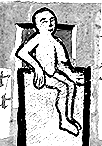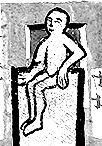



The womb-wheel turning, flowing inertia through life-giving gears.
The humble machine of birth-bearing, the body fabricating creation.
Eyes open, evincing the first flinch of life.
The life explodes—there is only truth, no hope of artifice.
And the room stands still, and time halts as well (if only to be polite), and the infant takes its initial breath.
And the beating goes on, and fills the room, and breaks like thunder in the eardrums deafened by the irrepressible sound, and the thunder is his heart.
The machine had no life but the one that was given to it, a little wooden box carved crudely into the shape of a heart.
Like the earth rotating slowly through space, the mechanical brain lolled and spun between its wood-and-metal gears.
The sky sighed deeply with each exhalation from the machine man; the moon clutched its chest each time he drew a breath.
Stars spun in flurries of excitement, incendiary snow burning the heavens and spitting fire onto creation.
His being was born, but somehow uncreated—he could not help but feel, in his particular unsentient and unsentimental way, that he was not truly existent—merely an artifice.
Each time he blinked the world blinked with him, the firmament closing upon the earth and rising up again as he opened his eyes, spiraling sight back to eyes and the universe into renewed and reinvigorated life.
Minutes blended to hours to years, time melting into a fluid amalgam of a life.
But there was an omnipresent emptiness, a looming void in the center of his unbeating heart.
Falsehoods filled every moment of his day, paper sun and moon dangled in a firmamental mirror of his artifice.
The Earth turned in its steady routine, lost in a labyrinthine system of confusion, an orbular screw affixed into unfathomable but insignificant gears.
Nothing was permanent—everything seemed always on the verge of falling apart—he walked absentmindedly, daydreaming, through a ramshackle and half-formed creation.
Nothing could steady him, nothing could draw him into the present, for the present was itself a fiction, terminally elusive, a vapor escaping from the lips and dissolving into a memory (already mostly forgotten) of one of innumerable gasps of breath.
With each passing year, now, he struggled more and more just to take a breath.
Time fell down around him in waves of deconstruction, miniature apocalypses swirling in etheric eddies and pooling at the feet of his stagnant life.
There was no motion—no flight—no creation.
A cinder of vagrant nostalgia landed on his forehead, burning a sigil of melancholy that floated gently down into his heart.
His machinery turned, and churned, and grated into an unsteady awakening, a reanimating of mossy and age-worn gears.
The ground beneath his feet pulsed like a neon light in love with its own artifice.
There was no more running from the artifice.
It was impossible to outpace the belabored weight of each failing breath.
Time caught up, the race was tied, energy fell like flotsam into the whirlpool of the body’s worn-down gears.
The sky cried out in songs of something-or-other—who could be sure what it meant?—and sent down rain like a humorous baptism of earthbound life.
A sweet painful song of sweetly painful love ran through his heart.
And there was nothing to sing to in all of creation.
There is a thread that runs through everything in this odd creation.
There is a truth that underlies and undermines all artifice.
There is a rhythm that gives music to the beating of our collective heart.
There is a harmony in our collective chorus of breath.
There is an unfathomable meaning in the strange chaos and indeterminacy of life.
There is a soul that fills the machine, a person that lives beyond the moment that motion leaves the gears.